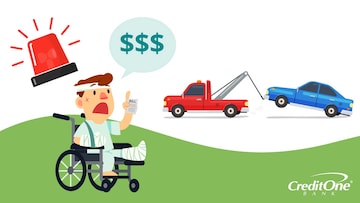How To Protect Your Credit Score During a Recession
May 08, 2024
A recession can come with plenty of financial stress. Thankfully there are steps you can take to protect your credit score during uncertain financial times.

Introduction
From the effects of inflation to job loss, when an economic recession rears its ugly head, the financial stresses can be overwhelming. These economic impacts can mean having to rely more on a credit card to get by. And if you’re low on cash, that credit reliance can turn into a growing debt that you can’t pay off, which then impacts your credit score. It can be a vicious cycle.
But, while there’s no way to guarantee your financial safety, there are some things you can do to help protect yourself — and your credit — during a recession.
What Is a Recession?
Summed up, a recession is a period of significant economic decline across the economy that lasts for several months or even years. A recession can result in high unemployment, falling incomes, declining production, and declining retail sales.
Know Your Credit Score and What Affects It
Knowing your credit score — that three-digit number that represents your creditworthiness to lenders — and what affects it is an important part of maintaining healthy finances. Why? Because if you know what can impact your score, then you know what to do — and not do — to keep it going in the right direction.
So, what can lower your credit score?
Making late payments – Payment history makes the biggest impact, accounting for 35% of your FICO score and over 40% of your VantageScore®.
Using too much credit – Your credit utilization ratio (CUR) is the measurement of your utilized credit to available credit. The higher it is, the worse it is for your score, and vice versa. Experts recommend keeping your CUR below 30%.
Applying for too many cards – Applying for a card means a hard inquiry on your credit report, which can lower your score by a few points.
Closing an account – Both your credit history and available credit are factors in determining your credit score. So when you close an account, you can end up hurting your credit because you’re lowering your average age of accounts — especially if you close an older card in good standing — and you’re reducing your total available credit.
How Does a Recession Impact Your Credit Score?
So, with all that said, you may be wondering: Can a recession impact my credit score? The short answer: Yes, but in an indirect way.
Your credit score is an indicator of how well you’re managing your credit. The better you do that — with timely payments and a healthy CUR, among other things — the higher your credit score will be. So, while a recession may not directly impact your score, a change to your financial situation during difficult times — such as a reduction in income leading to falling behind on payments or taking on too much new debt — could.
Luckily, there are some proactive steps you can take to protect your credit in tough economic times.
Build an Emergency Fund
One step you can take is to build an emergency fund. Doing so can create a safety net and help protect your credit by providing enough cash to cover costs while keeping you from racking up debt by solely relying on your credit card.
Experts recommend you save at least three to six months of living expenses in an account where you can get to it easily and quickly, such as a savings account. Doing so could help you better handle any payments that may arise.
Stick to a Budget
A second way to protect your credit during an economic recession is to stick to a budget.
Living within a budget is always a good idea. But it’s a particularly great one during questionable financial times. By sticking to a budget, you will be able to allocate your funds efficiently and ensure that you’re spending within your means. And, should you face a decrease in income, already having your ducks in a row will allow you to quickly pivot and adjust your budget accordingly. Living within a budget system prepares you to weather any difficult financial periods without increasing debt by relying heavily on a credit card.
Pay off Existing Debt
A third tip to protect your credit score if you think a recession is coming? Pay off any existing debt you may have.
As with the previous tips, this is a good idea for the best of times as well — but it can prove particularly impactful during tough economic times. By paying down your debt sooner than later, you allow yourself to reallocate those funds to other areas of need such as groceries, gas, or rent, or into your savings (see the emergency fund tip above). Paying off debt helps you avoid interest while also allowing you to take one of the most important steps toward improving your credit score.
Beyond improving your CUR, this preemptive step also frees up your credit for when you might need it most, becoming another emergency fund of sorts.
There’s no shortcut or one-size-fits-all way to paying down debt, but there are some strategies that you can employ to help you down the path to being debt-free, mainly:
The Snowball Method
With the snowball method, you pay off your smallest debt first while making the minimum payments on your other debts. When that debt is paid off, you move on to the next smallest and repeat the process until all your debts are paid off.
The Avalanche Method
When you use the avalanche method, you pay off debts based on interest rate. You make the minimum payments on all your debts, except the one with the highest rate — which you put as much as your budget will allow toward paying off as quickly as you can. When it’s paid in full, move on to the debt with the next highest interest rate and repeat until you’re debt-free.
Both methods can be effective. It all depends on which one fits your financial plan the best.
Cultivate Healthy Saving Practices
Whether there’s a recession on the horizon or not, it’s always a great idea to maintain healthy saving practices. Doing so can ensure you’ve got money in the bank for an emergency.
Along with creating and sticking to a budget, there are some things you can do to keep up your saving ways.
Take advantage of tech – From setting up autopay so you never miss a payment (and get hit with a late fee) to automatic transfers from checking into savings, technology can be a wonderful tool to keep you in tune with your account and help you save money along the way.
Shop around – Whether you’re getting some sort of service done or you’re looking for insurance, don’t just take the first price you get. Call other companies … search the internet … whatever the method, do your best to get other pricing options before you choose one.
Review subscriptions and memberships – Along the same lines of shopping around, always review your subscriptions and memberships and cancel the ones you’re not using or don’t need. Or, if available, consider cheaper ad-supported options.
High-yield savings – A high-yield savings account is a great tool for growing your money, providing a greater rate of return compared to a standard savings account due to higher annual percentage yield rates.
Trim Expenses
You’ve already started down this road by sticking to a budget, reviewing your subscriptions, and shopping around for better prices, but keep at it. Trimming your expenses is another way to open up more cash in case of a recession.
Other ways to trim your expenses include:
- Cooking at home more than dining out
- Reducing electricity and water use
- Buying generic instead of name brands
- Switching to reusable items
- Taking advantage of coupons and discounts
- Brewing your coffee at home every day instead of hitting up your local cafe
Some of these might seem insignificant, but the savings can add up in the long run.
Pursue Additional Income Streams
Another way to bring in extra money is to take on a side hustle. From handyman work to driving rideshare, an extra job can add a little more to your bank account and help you make ends meet. And if you can turn a hobby that you enjoy into a paying job, even better.
Bottom Line
While certain things, like the economy, may be out of your control, there are manageable choices you can make to protect yourself before the “rainy day” actually arrives.
And don’t be intimidated by the idea of buckling down. By making a plan and taking the first financial steps, no matter how small, you are well on your way to greater stability and ensuring that your credit score will endure the storm.




